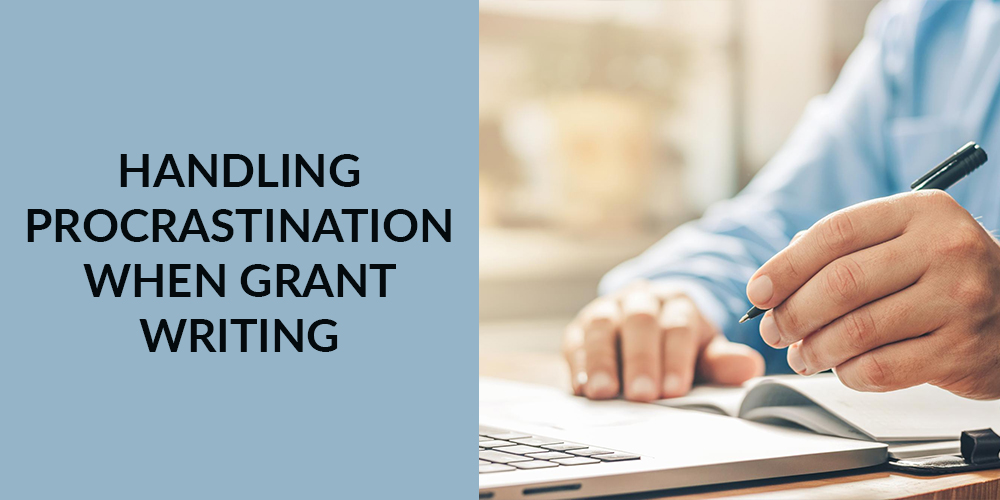Handling Procrastination When Grant Writing
When it comes to grant writing, it is fair to say that sometimes procrastination sets in. There is a myriad of reasons for this, but the most common cause is a sense of overwhelm about where to start. It might be that there are an extensive number of questions, or that the questions require a level of detail that you do not have at hand.
Whilst there is no one ‘right way’ to approach the task, this article looks at how the following tips can simplify the grant writing exercise to make some effective inroads to the job at hand:
- Assess where the value lies
- Focus on funding objectives
- Visually map the questions
- Create a Time plan
- Capture what you know first
- Enlist help early if needed
Assessing the Value
Many of the more complex grant writing applications will provide a table in the grant guidelines that outlines the weighting given by assessors when reviewing submissions. This is the very first thing you should look for to determine where you can gain the highest scores, and in turn, where to put the most effort. For example, there is little point putting 80% of effort into a section of the application that may only be worth 10% of the overall score if there are other sections that are 30%.
Focus on Objectives
There may or may not be any assessment weightings provided to guide your grant writing. However, one thing that will always exist are funding objectives. They may be called outcomes, or focus areas, but essentially, they are the reason the funding was created in the first place. It is vital that your grant writing response can show strong tie-ins between these objectives and your project’s purpose. Make some initial notes about these objectives with dot points about how your project links to these. You will expand on these points later, but the purpose of this exercise is to ensure you capture the essentials. Identify and highlight any information you need to seek elsewhere via research, or subject matter experts within your organisation.
Create a Visual Map
If you are still finding the grant writing to be overwhelming at this point, it can help to create a visual map of the questions (such as a mind map). Doing so will help you think with greater clarity and explore relationships between the questions, objectives, and your project. It can also help to identify subtle nuances between questions which seem identical at first glance. Take your map a step further by adding quick dot points that you can write about to address these questions. At this point, you now have a plan for how you can approach the whole grant writing exercise.
Plan Your Time
Now you have an idea of where you need to focus your efforts, as well as how you might answer each section, it is valuable to map out a time plan. Whilst it is not essential, it will keep you on track to prevent any last-minute rush as well as help to stir you into action. Doing this step will also ensure you allocate time to any areas that need significant research or digging to find the information to support your answers.
Capture What You Know
If you have not already captured what you know via your visual map, now is a good time to do so. At the same time, it is good to capture what you don’t know or need to find out. Create a scratchpad version of the application to copy out the questions and the information or answers you have to address them. Once you layout all this information on a scratchpad, it can help to identify any gaps where further information is needed.
Using two different coloured highlighters at this point can help; one to identify where you need to seek help from others and another to identify where you need to research online.
Enlist Help Early
It is quite rare that any grant writer acts completely on their own. Within the organisation, there is a wealth of knowledge and expertise to tap into that can assist with creating strong and convincing answers. However, these people usually have their own time pressures and deadlines within their own job scope, so it is important that you respect these if you seek to enlist their help. Ensure you let them know very early in the grant writing exercise that you will need information or help from these. Provide as much detail as possible as to the type of information needed and seek to agree a timeline for when they will have this information ready. Ensure the agreed delivery time does not fall too close to the actual grant submission deadline in case you need to seek more detail or do any significant presentation or rewrite efforts on their contributions.
Given procrastination is often linked to a fear of failure or a need for perfection, it is important that when you do experience it during grant writing to find a productive way out. The above tips basically all relate to one thing; breaking it down until you can see a way forward. Whilst it will not guarantee success or perfection, it gets you started on your grant writing effectively and sets you up for success as you focus on what is most important in the application.

